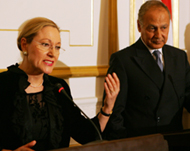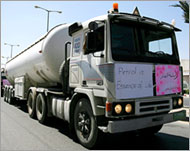EU agrees on Palestinian aid plan
European Union leaders have endorsed a plan to channel aid to Palestinians focusing on health, power supply and support for needy families, while maintaining a funding freeze on the Hamas-led government.

A final statement from the EU summit on Friday said the 25-member bloc “stands ready to contribute a substantial amount to the international mechanism,” which would channel aid to the Palestinians but bypass Hamas.
Emma Udwin, EU spokeswoman, said the EU was considering an initial allocation of about $126 million.
She told reporters the EU wanted to have the funding mechanism working by early July.
Benita Ferrero-Waldner, the External Relations Commissioner, said: “We Europeans are determined to play our part in preventing a humanitarian crisis in the Palestinian territories.”
She will head to Middle East on Monday to present the plan.
The EU statement said the plan was drawn up in consultation with the United States, Russia and the United Nations, who agreed with the EU in May that a mechanism had to be found to keep the Palestinian economy afloat after most international aid was cut off after Hamas’ January election win.
Udwin said she expected final approval from the full Quartet group of Middle East mediators and other donors within days.
‘Social allowances’
There was no mention in the statement of payment of salaries to Palestinian government workers – which is opposed by Israel – but it did refer to “social allowances” by which EU would entail payments to health workers and other needy families.
 |
|
Ferrero-Waldner (L): EU considers |
“Nobody is paying wages, forget wages,” Udwin said.
“There is a big difference between wage and allowance.”
The fund will be managed by the World Bank and the EU, working with the office of Palestinian President Mahmoud Abbas whose Fatah movement is Hamas’ main political rival.
EU leaders said there would be no contact with Hamas unless it renounced violence, recognised Israel and respected existing peace agreements.
“There can be no business as usual with a government that has not yet accepted the fundamental principle of peace,” Ferrero-Waldner said.
Israel pushed
The EU has urged Israel to resume the transfer of more than $50 million in monthly tax revenues it collects on behalf of the Palestinians.
Those funds are “essential in averting a crisis in the Palestinian territories,” the draft EU statement said.
The EU said the revenues could be channelled through the new mechanism.
Israel blocked those funds after the Hamas election victory.
 |
|
The EU will focus on securing |
The EU, the US and other donors also froze hundreds of millions of dollars in direct aid to the Palestinian government after the win by Hamas, which the EU and US have branded as a terrorist organisation.
The aid freeze has meant that about 165,000 government employees, including teachers, health workers and security personnel, have not been paid in three months.
In its statement, the EU urged other donors, including Arab states, to “consider early and substantial contributions.”
The mechanism will have three parts: one managed by the World Bank will focus on maintaining health services including “basic allowances” for doctors and nurses; the second will aim to secure essential utilities such as fuel supplies; the third will create a “social safety net” making direct bank transfers to the accounts of needy families.
“All three of these elements will operate with strict controls and in full accountability and transparency,” Udwin said.
Condemnation
The EU draft statement urged Israel to resume peace talks with Abbas.
It urged him to disarm violent groups and halt attacks on Israel.
In a message to the Israelis, the EU condemned violence against Palestinian civilians and urged a halt to “any action that threatens the viability of an agreed two-state solution and from acts that are contrary to international law.”
The statement referred in particular to the construction of Israel’s West Bank security barrier and Jewish settlements in the area.
Referring to Israeli prime minister Ehud Olmert’s determination to draw Israel’s final borders by 2010 – with or without an agreement with the Palestinians – the EU said it “will not recognise any change to the pre-1967 border other than those agreed by both sides.”